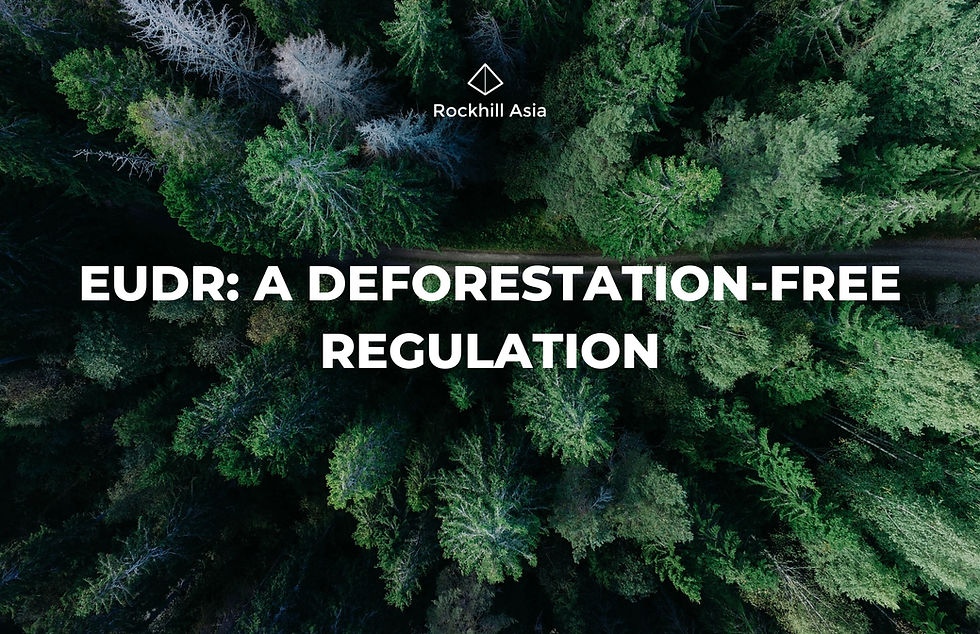What is EUDR: The EU Deforestation Regulation
- Thu Uyên Đỗ
- Nov 17, 2023
- 8 min read
Updated: Jul 2, 2024

In an increasingly sustainability-driven global market, companies must not only consider environmental impact but also consumer preferences for eco-conscious products. The European Union's Deforestation Regulation (EUDR) has emerged as a significant step in addressing deforestation, setting ambitious goals for deforestation-free supply chains.
This article is an essential resource for businesses of all sizes, including exporters and operators involved in the production, import, and sale of deforestation-linked products. It provides the overview of the regulation, including its implementation timeline, applicable product list, due diligence statement, and country risk classification.
What is EUDR?
Deforestation, the clearance of forests for various purposes, has far-reaching environmental and social consequences. The EUDR, or European Union Deforestation Regulation, is a significant step taken by the European Union to address this global challenge. It aims to prevent deforestation and forest degradation by regulating the import of forest-risk commodities into EU Member States.
EUDR’s Timeline for Implementation
May 2003: The EU adopted the Forest Law Enforcement, Governance and Trade (FLEGT) Action Plan
2014: New York Declaration on Forests publishes a global timeline to slow and end forest loss during the UN Climate Summit 2014.
November 2021: The European Commission adopted a proposal for a regulation on deforestation-free products.
December 2022: The EU agreed on a Regulation for deforestation-free products to guarantee products EU citizens consume do not contribute to deforestation or forest degradation.
June 29, 2023: The European Parliament and Council formally adopted the EUDR.
December 30, 2024: EUDR goes into effect. (for non SMEs Traders and Operators - 18 months transition)
June 30, 2025: The EUDR becomes effective for micro and small exporters. Definitions for micro and small exporters have not been determined. (for SMEs Traders - 24 months transition)
EUDR Applicable Category List

Cocoa & chocolate
Coffee
Palm oil
Wood
Soy
Cattle & Beef
Rubber
Derived products such as leather, furniture, chocolate, tires, shoes, and more.
Example: Meat products, leather, chocolate, coffee, palm nuts, palm oil derivatives, glycerol, natural rubber products, soybeans, soy-bean flour and oil, fuel wood, wood products, pulp and paper, printed books)
Over the course of the next two years a review will be carried out, potentially adding additional products to this list.
EUDR Applicable Product List
The regulation only applies to certain types of products. These products are identified by specific EU customs codes listed in Annex I. Any product with a customs code not on this list is generally exempt from the regulation. In other words, only products matching a code in Annex I need to comply with the regulation's requirements.
Relevant Commodity | Relevant Products |
Cattle |
|
Cocoa |
|
Coffee | Coffee, whether or not roasted or decaffeinated; coffee husks and skins; coffee substitutes containing coffee in any proportion (0901) |
Oil Palm | Palm nuts and kernels (1207 10)
|
Rubber | Natural rubber, balata, gutta-percha, guayule, chicle and similar natural gums, in primary forms or in plates, sheets or strip (4001)
|
Soya |
|
Wood |
|
EUDR Due Diligence Statement
Company’s details: the products, the quantity, the geolocation of all plots of land where the commodities were produced - stating that there is no - or only a negligible - risk of non-compliance.
When re-importing products previously exported from the EU and placing them under the 'release for free circulation' customs procedure, the same obligations apply as if the product were being placed on the market for the first time. Leveraging existing due diligence statements can assist operators in more seamlessly exercising due diligence during this process.
EUDR Country Risk classification
The Deforestation Regulation imposes on operators and traders an obligation to carry out due diligence to ensure that the products are deforestation-free, based on a Commission-run benchmark identifying countries (within and outside the EU) as low standard or high risk.
The Commission will need to publish the list of the countries or parts thereof, that present a low or high risk no later than 30 December 2024. That list will then be reviewed and updated as often as necessary.
This risk classification will be primarily based on:
The rate of deforestation
Forest degradation
Expansion of agricultural land for relevant commodities
Production trends of relevant commodities and products.
However, the Commission may also take into consideration the laws protecting human rights, the rights of indigenous peoples, local communities and other customary tenure rights holders
The European Union Deforestation Regulation represents a vital step toward achieving sustainable sourcing practices as well as combating deforestation, mitigating climate change, and preserving biodiversity. While it holds the potential for substantial positive impacts, including emissions reduction and habitat protection, it also presents significant challenges for businesses in terms of compliance, transparency, and technology adoption. Achieving success under this regulation will require ongoing collaboration, innovation, and adaptation across the supply chain and regulatory landscape.
Stay tuned for our upcoming articles, where Rockhill Asia delves deeper into the details of EUDR's due diligence process, identifies stakeholders who are concerned or impacted, and explores its broader implications.
Contact us today to learn more about our procurement outsourcing services and how we can help your business efficiently source high-quality products across Asia.
Learn more about our Procurement Outsourcing Services.
Check out our LinkedIn.



















